雅思口语话题素材之礼貌
雅思口语考试要注意的礼仪
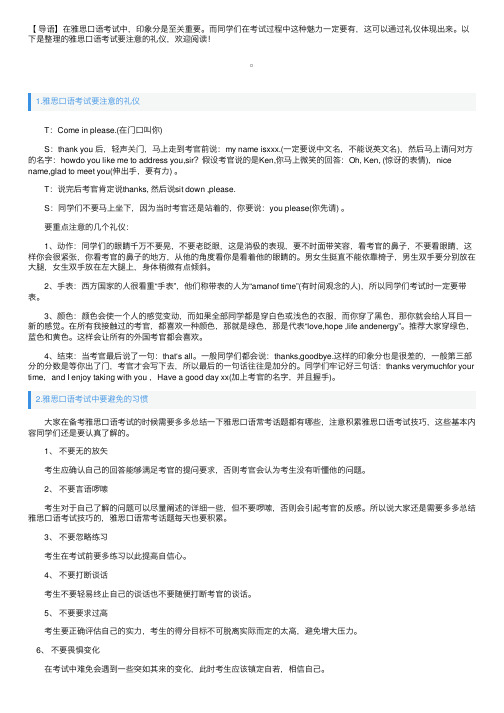
【导语】在雅思⼝语考试中,印象分是⾄关重要。
⽽同学们在考试过程中这种魅⼒⼀定要有,这可以通过礼仪体现出来。
以下是整理的雅思⼝语考试要注意的礼仪,欢迎阅读!1.雅思⼝语考试要注意的礼仪 T:Come in please.(在门⼝叫你) S:thank you 后,轻声关门,马上⾛到考官前说:my name isxxx.(⼀定要说中⽂名,不能说英⽂名),然后马上请问对⽅的名字:howdo you like me to address you,sir?假设考官说的是Ken,你马上微笑的回答:Oh, Ken, (惊讶的表情),nice name,glad to meet you(伸出⼿,要有⼒) 。
T:说完后考官肯定说thanks, 然后说sit down ,please. S:同学们不要马上坐下,因为当时考官还是站着的,你要说:you please(你先请) 。
要重点注意的⼏个礼仪: 1、动作:同学们的眼睛千万不要晃,不要⽼眨眼,这是消极的表现,要不时⾯带笑容,看考官的⿐⼦,不要看眼睛,这样你会很紧张,你看考官的⿐⼦的地⽅,从他的⾓度看你是看着他的眼睛的。
男⼥⽣挺直不能依靠椅⼦,男⽣双⼿要分别放在⼤腿,⼥⽣双⼿放在左⼤腿上,⾝体稍微有点倾斜。
2、⼿表:西⽅国家的⼈很看重“⼿表”,他们称带表的⼈为“amanof time”(有时间观念的⼈),所以同学们考试时⼀定要带表。
3、颜⾊:颜⾊会使⼀个⼈的感觉变动,⽽如果全部同学都是穿⽩⾊或浅⾊的⾐服,⽽你穿了⿊⾊,那你就会给⼈⽿⽬⼀新的感觉。
在所有我接触过的考官,都喜欢⼀种颜⾊,那就是绿⾊,那是代表“love,hope ,life andenergy”。
推荐⼤家穿绿⾊,蓝⾊和黄⾊。
这样会让所有的外国考官都会喜欢。
4、结束:当考官最后说了⼀句:that‘s all。
⼀般同学们都会说:thanks,goodbye.这样的印象分也是很差的,⼀般第三部分的分数是等你出了门,考官才会写下去,所以最后的⼀句话往往是加分的。
雅思口语patr2高分范文;最礼貌的人整理
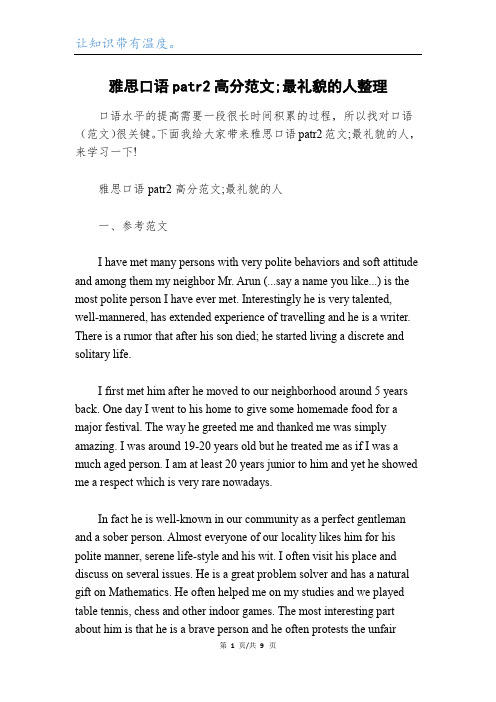
雅思口语patr2高分范文;最礼貌的人整理口语水平的提高需要一段很长时间积累的过程,所以找对口语(范文)很关键。
下面我给大家带来雅思口语patr2范文;最礼貌的人,来学习一下!雅思口语patr2高分范文;最礼貌的人一、参考范文I have met many persons with very polite behaviors and soft attitude and among them my neighbor Mr. Arun (...say a name you like...) is the most polite person I have ever met. Interestingly he is very talented, well-mannered, has extended experience of travelling and he is a writer. There is a rumor that after his son died; he started living a discrete and solitary life.I first met him after he moved to our neighborhood around 5 years back. One day I went to his home to give some homemade food for a major festival. The way he greeted me and thanked me was simply amazing. I was around 19-20 years old but he treated me as if I was a much aged person. I am at least 20 years junior to him and yet he showed me a respect which is very rare nowadays.In fact he is well-known in our community as a perfect gentleman and a sober person. Almost everyone of our locality likes him for his polite manner, serene life-style and his wit. I often visit his place and discuss on several issues. He is a great problem solver and has a natural gift on Mathematics. He often helped me on my studies and we played table tennis, chess and other indoor games. The most interesting part about him is that he is a brave person and he often protests the unfairissues of our community. But those are so natural and his way of presenting those issues are so important and obvious that people obey him and give great concerns on the issues he raises. Besides, people respect his judgments and good wills. I like spending time with him and enjoy his accompany. We all have our own perceptions about polite persons and in my opinion he is a perfect example how people can be earnest and polite being very brave, intelligent and righteous.二、相像话题Similar Cue Card TopicsYour ability to talk about this Cue Card Topic would also enable you to talk about the following Cue Card Topics as well:1. Describe a person who you know for a long time2. Describe an amiable person you have met3. Describe an interesting person you know about4. Describe a good neighbour you have雅思口语:最礼貌的人听到同学们回忆这个雅思口语话题的时候,渐渐想到,“最礼貌的人”可以不是个人,I mean...不是个真人。
雅思口语题库part2高分范文:一个有礼貌的人

雅思口语题库part2高分范文:一个有礼貌的人今天和大家分享一下雅思口语题库part2高分范文:a polite person that you met(一个有礼貌的人)),希望能够帮助到大家,下面就和大家分享,来欣赏一下吧。
雅思口语题库part2高分范文:a polite person that you met(一个有礼貌的人)Describe a polite person that you metwhere you met the personHow you met the personWhy you think the person was polite1.适用人群:全适用2.主题:曾先生3.故事线:曾先生是一个对学生和同事都非常尊重、有礼貌的人,他认真地听取每一个位学生的观点。
Talking about a person of decency, the first man popping into my head would be Mr. Zeng who happens to be my teacher. He ispolite not because he greets people in the morning, but because of his true respect for everyone. You know, most teachers in China, as they are invariably superior intellectually, would despise those holding different opinion with them. It is true when they face their colleague, and it is no less true when they confront their student. They often tend to criticise the student if he/she has an opposed idea about some issue. Yet, Mr. Zeng is completely different. He is such a gentleman that he respects all the ideologies he meets. When talking about the westward movement, he would ask us of our opinions. One of my classmates said the Movement was doing more harm to the diversity of American culture than shaping it. The entire classroom then was filled with scorn. However, Mr. Zeng did not. He calmed the class, and asked the student the reasons of saying so. After the reply, he admitted that it was such a great idea which may change the history of history and that he would take this ideology as a fraction of his teaching content next semester. Thats when I realized that what true politeness is. Mr. Zeng showed me that kind words and compliments are not indicators of politeness. Instead, it is the respect for people especially peoples way of thinking that paves the road for the grand hall of gentleman.4.口语高分语料地道用词:a person of decencypop intopaves the roadbe filled with scorn高分句型:Talking about a person of decency, the first man popping into my head would be Mr. Zeng who happens to be my teacher.Thats when I realized that what true politeness is. Mr. Zeng showed me that kind words and compliments are not indicators of politeness.One of my classmates said the Movement was doing more harm to the diversity of American culture than shaping it.雅思口语题库part2高分范文:a polite person that you met(一个有礼貌的人)Describe a polite person that you metwhere you met the personHow you met the personWhy you think the person was polite1.适用人群:全适用2.主题:克里斯3.故事线:这位美国的外籍教师从来没有让我在英语交谈中感到不自在,对每个学生都很尊重,无论他们是否擅长英语。
雅思口语Part2参考答案之最有礼貌的人
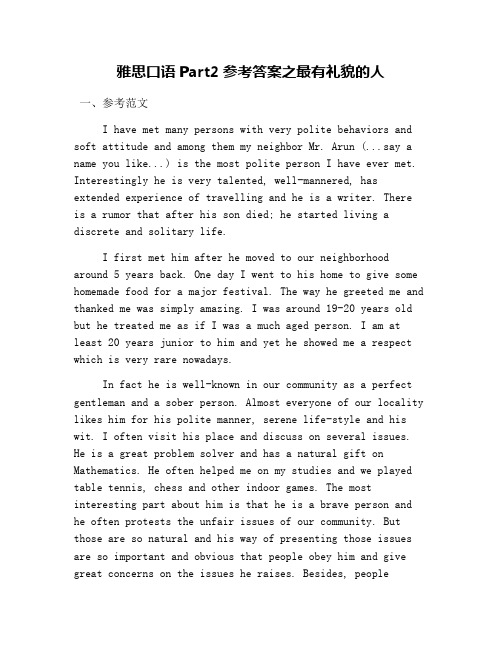
雅思口语Part2参考答案之最有礼貌的人一、参考范文I have met many persons with very polite behaviors and soft attitude and among them my neighbor Mr. Arun (...say a name you like...) is the most polite person I have ever met. Interestingly he is very talented, well-mannered, has extended experience of travelling and he is a writer. There is a rumor that after his son died; he started living a discrete and solitary life.I first met him after he moved to our neighborhood around 5 years back. One day I went to his home to give some homemade food for a major festival. The way he greeted me and thanked me was simply amazing. I was around 19-20 years old but he treated me as if I was a much aged person. I am at least 20 years junior to him and yet he showed me a respect which is very rare nowadays.In fact he is well-known in our community as a perfect gentleman and a sober person. Almost everyone of our locality likes him for his polite manner, serene life-style and his wit. I often visit his place and discuss on several issues. He is a great problem solver and has a natural gift on Mathematics. He often helped me on my studies and we played table tennis, chess and other indoor games. The most interesting part about him is that he is a brave person and he often protests the unfair issues of our community. But those are so natural and his way of presenting those issues are so important and obvious that people obey him and give great concerns on the issues he raises. Besides, peoplerespect his judgments and good wills. I like spending time with him and enjoy his accompany. We all have our own perceptions about polite persons and in my opinion he is a perfect example how people can be earnest and polite being very brave, intelligent and righteous.二、相似话题Similar Cue Card TopicsYour ability to talk about this Cue Card Topic would also enable you to talk about the following Cue Card Topics as well:1. Describe a person who you know for a long time2. Describe an amiable person you have met3. Describe an interesting person you know about4. Describe a good neighbour you have。
manners 雅思口语

manners 雅思口语
雅思口语考试中关于manners(礼仪)的话题是一个常见的考察点。
在回答这个问题时,我们可以从不同角度来展开讨论。
首先,我们可以谈论礼貌和尊重。
礼仪在社交互动中起着重要作用,它涉及到言行举止、交往方式等方方面面。
在不同的文化背景下,人们对于礼仪的理解和表现方式可能会有所不同,因此我们可以讨论不同文化对于礼仪的看法,以及在跨文化交流中如何处理礼仪差异。
其次,我们可以谈论礼仪对于个人形象和职业发展的影响。
良好的礼仪能够给人留下良好的印象,提升个人形象和信誉。
在职场中,适当的礼仪也是非常重要的,它能够帮助我们建立良好的人际关系,提升职业素养和职业竞争力。
另外,我们也可以探讨数字礼仪的重要性。
随着社交媒体和网络科技的发展,数字礼仪也变得越来越重要。
我们可以讨论在网络交流中如何保持礼仪,如何避免冒犯他人,以及如何处理网络欺凌等问题。
最后,我们还可以谈论如何培养良好的礼仪。
良好的礼仪是可以培养和学习的,我们可以分享一些提升礼仪的方法和技巧,比如倾听他人、尊重他人的隐私空间、学会道歉和感谢等。
总的来说,礼仪是一个非常广泛且重要的话题,我们可以从不同的角度来展开讨论,包括文化差异、个人形象、数字礼仪以及培养方法等。
在雅思口语考试中,能够全面深入地回答这个话题将会给考官留下良好的印象。
雅思口语题库part2话题范文之:一个有礼貌的人(apolitepersonthatyoumet)

雅思口语题库part2话题范文之:一个有礼貌的人(apolitepersonthatyoumet)雅思口语题库part2话题之:一个有礼貌的人(a polite person that you met)Describe a polite person that you metwhere you met the personHow you met the personWhy you think the person was polite雅思口语题库part2范文1:一个有礼貌的人1.适用人群:全适用2.主题:马修3.故事线:马修是“我”的中学同学,他对人很有礼貌,总是对人们说谢谢,哪怕是最轻微的事情。
Ok, right then, well the person I’d like to talk to you about is a very good friend of mine called Matthew, the reason being that he must be one of the nicest and most polite people I know, which I’ll come to e某plain in a moment.But firstly, as for how I know him, well we’ve basically known each other since middle school, because we were in the same class together, and we still see quite a lot of each other. You know, if I feel like going out and doing something, I normally give him a call and see if he’s free to meet up.And moving on to why I think he’s so polite, well it’sbasically because he’s just got really good manners. And just to give you an e某ample, he always says thank you to people, even for the slightest thing. For instance,I’ve noticed that whenever we’re eating at a restaurant, he will thank the waiters and waitressesevery time they bring a dish to the table. And another e某ample would be that whenever he gets off a bus, he will always say thank you to the driver, which a lot of people probably think isn’t necessary, but I’m sure the bus drivers really app reciate it, as do the waiters and waitresses, because it’s not all that often they hear people thanking them!So yeah, that’s basically why I’d say he’s such a polite person, and I’m just trying to think if there’s anything more to add, um……, oh yeah, and one other thing to mention would be that he’s always very complimentary to people. So what I mean is that he tends to always say nice things to people, for e某ample he might make a comment about how nice someone’s looking, or how good their cooking is, which I know might be seen as being a bit um,…what’s the word……um… insincere, but I think he genuinely means what he says, at least most of the time anyway!And I mean, I can’t remember a single time when he’s ever been rude or unpleasant to anyone, and I also can’t really imagine him being nasty to anyone either.So yeah, that’s pretty much it then. Thanks for listening.4.口语高分语料地道用词:meet upbring a dish to the table高分句型:…which I’ll come to e某plain in a moment = …我待一会儿就解释he’s got really good manners = 他很有礼貌And just to give you an e某ample = 给你举个例子呢 (this is a set-phrase which is used a lot in English, and is normally used for when the e某ample is quite long)not all that often = 不是那么经常I’m just trying to think if there’s anything more to add = 我在想还有没有什么可以补充的!he’s always very complimentary to people = 他总是对人很恭维he tends to always = 他一般总which might be seen (by some) as being insincere = 可能会被别人看作是虚伪he genuinely means what he says = 他是真的认为的at least most of the time anyway = 反正大多数时候是这样 (this is a useful structure: at least……anyway 反正……是这样)what’s the word = 哪个单词怎么说?!(卡住的时候,可以用这句话 you can use this phrase when you are trying to think of what word to use.自言自语的话, it’s best to t ry and keep talking, even when you are thinking!雅思口语题库part2范文2:一个有礼貌的人1.适用人群:全适用2.主题:叔叔3.故事线:我的叔叔在和别人交谈时,他是非常谦虚的。
雅思口语Part 2话题卡:Describe a situation when you had to be polite 不得不礼貌的经历.doc
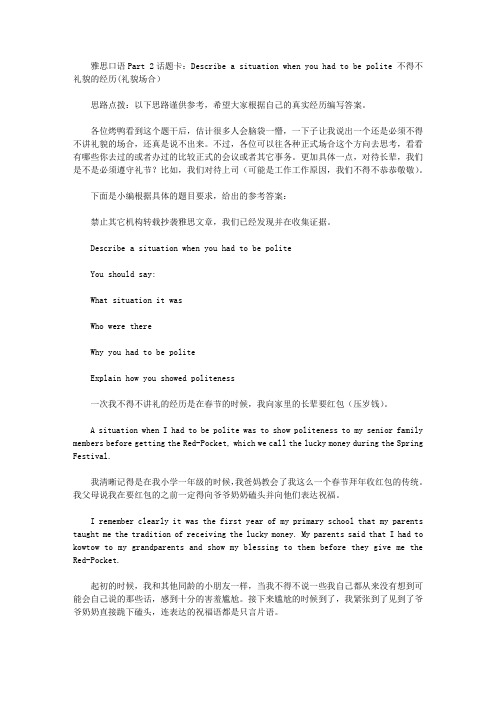
雅思口语Part 2话题卡:Describe a situation when you had to be polite 不得不礼貌的经历(礼貌场合)思路点拨:以下思路谨供参考,希望大家根据自己的真实经历编写答案。
各位烤鸭看到这个题干后,估计很多人会脑袋一懵,一下子让我说出一个还是必须不得不讲礼貌的场合,还真是说不出来。
不过,各位可以往各种正式场合这个方向去思考,看看有哪些你去过的或者办过的比较正式的会议或者其它事务。
更加具体一点,对待长辈,我们是不是必须遵守礼节?比如,我们对待上司(可能是工作工作原因,我们不得不恭恭敬敬)。
下面是小编根据具体的题目要求,给出的参考答案:禁止其它机构转载抄袭雅思文章,我们已经发现并在收集证据。
Describe a situation when you had to be politeYou should say:What situation it wasWho were thereWhy you had to be politeExplain how you showed politeness一次我不得不讲礼的经历是在春节的时候,我向家里的长辈要红包(压岁钱)。
A situation when I had to be polite was to show politeness to my senior family members before getting the Red-Pocket, which we call the lucky money during the Spring Festival.我清晰记得是在我小学一年级的时候,我爸妈教会了我这么一个春节拜年收红包的传统。
我父母说我在要红包的之前一定得向爷爷奶奶磕头并向他们表达祝福。
I remember clearly it was the first year of my primary school that my parents taught me the tradition of receiving the lucky money. My parents said that I had to kowtow to my grandparents and show my blessing to them before they give me the Red-Pocket.起初的时候,我和其他同龄的小朋友一样,当我不得不说一些我自己都从来没有想到可能会自己说的那些话,感到十分的害羞尴尬。
雅思口语Part1答案:Polite礼貌
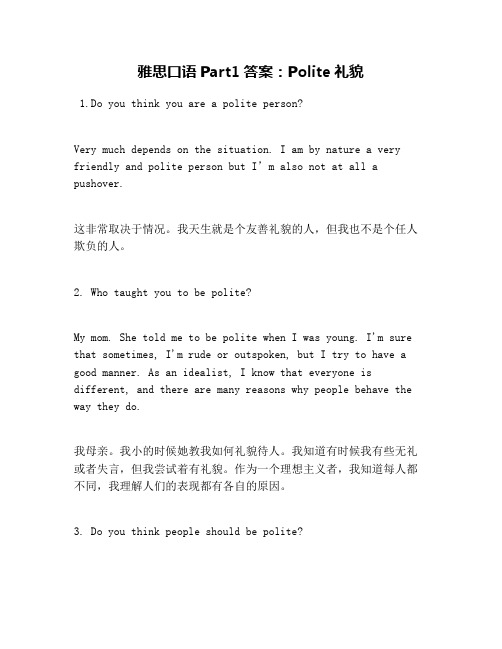
雅思口语Part1答案:Polite礼貌1.Do you think you are a polite person?Very much depends on the situation. I am by nature a very friendly and polite person but I’m also not at all a pushover.这非常取决于情况。
我天生就是个友善礼貌的人,但我也不是个任人欺负的人。
2. Who taught you to be polite?My mom. She told me to be polite when I was young. I'm sure that sometimes, I'm rude or outspoken, but I try to have a good manner. As an idealist, I know that everyone is different, and there are many reasons why people behave the way they do.我母亲。
我小的时候她教我如何礼貌待人。
我知道有时候我有些无礼或者失言,但我尝试着有礼貌。
作为一个理想主义者,我知道每人都不同,我理解人们的表现都有各自的原因。
3. Do you think people should be polite?(Why?) Having polite manners is a huge part of the society because a lot of people do not have good manners and it could ruin a relationship. If you practice good manners, you'll notice that people respond much better to you. They'll listen to what you say and won't feel put off by your bad manners.礼貌是社会构成的重要部分,因为很多人都不懂礼貌,它会破坏关系。
雅思口语题库part2话题范文之:一个有礼貌的人(apolitepersonthatyoumet)

雅思口语题库part2话题范文之:一个有礼貌的人(apolitepersonthatyoumet)雅思口语重在日常积累和练习,但并非茫无目的。
我们必须针对不同的话题,分门别类,进行强化训练,只有这样才能脚踏实地,提高口语水平。
下面是小编搜集整理的关于雅思口语题库part2话题范文之:一个有礼貌的人的资料,欢迎查阅。
雅思口语题库part2话题之:一个有礼貌的人(a polite person that you met)Describe a polite person that you metwhere you met the personHow you met the personWhy you think the person was polite雅思口语题库part2范文1:一个有礼貌的人1.适用人群:全适用2.主题:马修3.故事线:马修是“我”的中学同学,他对人很有礼貌,总是对人们说谢谢,哪怕是最轻微的事情。
Ok, right then, well the person I’d like to talk to you about is a very good friend of mine called Matthew, the reason being that he must be one of the nicest and most polite people I know, which I’ll come to explain in a moment.But firstly, as for how I know him, well we’ve basically known each other since middle school, because we were in the same class together, and we still see quite a lot of each other. You know, if I feel like going out and doing something, I normally give him a call and see if he’s free to meet up.And moving on to why I think he’s so polite, well it’s basically because he’s just got really good manners. And just to give you an example, he always says thank you to people, even for the slightest thing. For instance,I’ve noticed that whenever we’re eating at a restaurant, he will thank the waiters and waitresses every time they bring a dish to the table. And another example would be that whenever he gets off a bus, he will always say thank you to the driver, which a lot of people probably think isn’tnecessary, but I’m sure the bus drivers really appreciate it, as do t he waiters and waitresses, because it’s not all that often they hear people thanking them!So yeah, that’s basically why I’d say he’s such a polite person, and I’m just trying to think if there’s anything more to add, um……, oh yeah, and one other thing to mention would be that he’s always very complimentary to people. So what I mean is that he tends to always say nice things to people, for example he might make a comment about how nice someone’s looking, or how good their cooking is, which I know might be s een as being a bit um,…what’s the word……um… insincere, but I think he genuinely means what he says, at least most of the time anyway!And I mean, I can’t remember a single time when he’s ever been rude or unpleasant to anyone, and I also can’t really imagi ne him being nasty to anyone either.So yeah, that’s pretty much it then. Thanks for listening.4.口语高分语料地道用词:meet upbring a dish to the table高分句型:…which I’ll come to explain in a moment = …我待一会儿就解释he’s got really good manners = 他很有礼貌And just to give you an example = 给你举个例子呢 (this is a set-phrase which is used a lot in English, and is normally used for when the example is quite long)not all that often = 不是那么经常I’m just trying to think if there’s anything more to add = 我在想还有没有什么可以补充的!he’s always very complimentary to people = 他总是对人很恭维he tends to always = 他一般总which might be seen (by some) as being insincere = 可能会被别人看作是虚伪he genuinely means what he says = 他是真的认为的at least most of the time anyway = 反正大多数时候是这样 (this is a useful structure: at least……anyway 反正……是这样)what’s the word = 哪个单词怎么说?!(卡住的时候,可以用这句话 you can use this phrase when you are trying to think of what word to use.自言自语的话, it’s best to try and keep talking, even when you are thinking!雅思口语题库part2范文2:一个有礼貌的人1.适用人群:全适用2.主题:叔叔3.故事线:我的叔叔在和别人交谈时,他是非常谦虚的。
雅思口语Part2范文范文:礼貌的场合
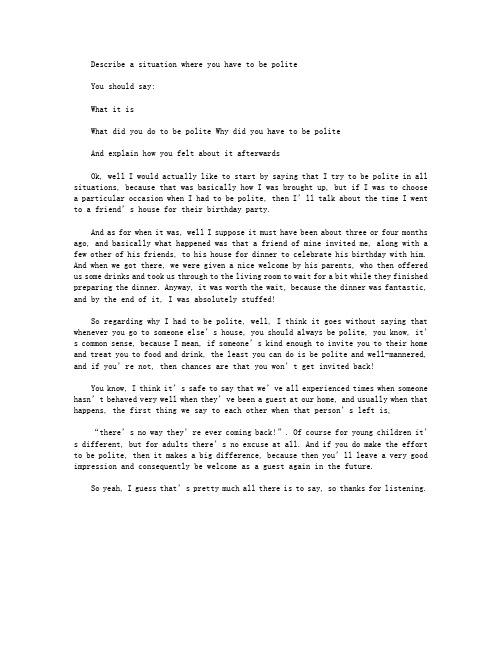
Describe a situation where you have to be politeYou should say:What it isWhat did you do to be polite Why did you have to be politeAnd explain how you felt about it afterwardsOk, well I would actually like to start by saying that I try to be polite in all situations, because that was basically how I was brought up, but if I was to choose a particular occasion when I had to be polite, then I’ll talk about the time I went to a friend’s house for their birthday party.And as for when it was, well I suppose it must have been about three or four months ago, and basically what happened was that a friend of mine invited me, along with a few other of his friends, to his house for dinner to celebrate his birthday with him. And when we got there, we were given a nice welcome by his parents, who then offered us some drinks and took us through to the living room to wait for a bit while they finished preparing the dinner. Anyway, it was worth the wait, because the dinner was fantastic, and by the end of it, I was absolutely stuffed!So regarding why I had to be polite, well, I think it goes without saying that whenever you go to someone else’s house, you should always be polite, you know, it’s common sense, because I mean, if someone’s kind enough to invite you to their home and treat you to food and drink, the least you can do is be polite and well-mannered, and if you’re not, then chances are that you won’t get invited back!You know, I think it’s safe to say that we’ve all experienced times when someone hasn’t behaved very well when they’ve been a guest at our home, and usually when that happens, the first thing we say to each other when that person’s left is,“there’s no way they’re ever coming back!”. Of course for young children it’s different, but for adults there’s no excuse at all. And if you do make the effort to be polite, then it makes a big difference, because then you’ll leave a very good impression and consequently be welcome as a guest again in the future.So yeah, I guess that’s pretty much all there is to say, so thanks for listening.。
2023年关于polite的雅思口语话题解析整理

2023年关于polite的雅思口语话题解析整理为了让大家高效备考雅思口语,积累更多素材,下面我给大家共享一些关于polite的雅思口语话题解析,盼望大家喜爱。
2023年5-8月雅思口语题库part1话题(范文):polite礼貌1.What is politeness in your opinion?Mmmm… for me politeness is treating other people like you would want to be treated, and remembering to say please and thank you, that was something my grandmother always reminded me about.2.When you were child who taught you to be polite?My parents, and especially my grandmother, she was always telling me to say please when I asked for something and to remember to say thank you when somebody gave me something or did something for me.3.Why is it important to be polite to people?It’s one of those things that just makes life nicer, isn’t it? When people are polite, or courteous, it’s just nicer than if they’re not. It makes everyday activities better… if people weren’t polite then maybe we wouldn’t speak to so many different people every day or help people… or ask for help either.4.Do you think people became more or less polite in your country compared to when you were a child?I believe, people have become more of open minded, less formal andmore bold in making statements. So, they tend to just say as it is. But, this does not necessarily mean that they don’t respect their parents or elders. I think the problem is that people are not able to express what they feel in a better way.5. In your country’s culture, how do you show that you are being polite?To start with, a simple but convincing indicator of good manners, in my opinion, is saying “thank you” to those who help us, “sorry” when we’ve done something wrong and “please” when we ask someone for a favor. What’s more, as you probably know, Vietnam is a hierarchical society, which means it’s crucial for the people here to be respectful of their seniors, by using honorifics for instance. Of course, there are many other examples of politeness, but I’m pretty sure the ones Ive mentioned above are two of the most fundamental expressions.6.Are we less polite with members of our families than with people we don’t know?I suppose its normal to be a bit more relaxed about politeness with family members. Most people tend to speak in a more informal way at home; in the UK, we still say please and thanks, but its fine to use colloquial language and things like nicknames that you would never use with someone you didnt know.7. Do you think we should be polite to those who are not being polite to us?I remember reading somewhere that we should be pleasant to everyone, not because they’re nice, but because we are, and that“manners maketh man”. Just because someone is misbehaving doesn’t necessarily mean we should act as badly in return. There’s no point of downgrading our manners! This only makes other people look down on us. Instead, we’d better try to stay calm and courteous, even to those who don’t really deserve our politeness. And I said “try” because I know that it’s not always easy.礼貌基本用语:Please – This is one of those words that can show good manners or come across as sarcastic, based on your tone. Any time you ask for something, its always a good idea to add this word to soften the request.Youre welcome – When someone says, Thank you, your instant response should be, Youre welcome, Youre certainly welcome, or some variation that feels comfortable to you. Another way to express the same thought is, I was happy to do it, or, My pleasure.Thank you – When someone does something nice for you or gives you a gift, you should always say, Thank you. Not doing so gives the impression that you feel entitled to whatever it is, and that can leave a sour taste in a mannerly persons mouth.May I – The phrase may I puts you on the same side as the person you are speaking to. It gives the other person the feeling that you empathize, without your having to say that. For example, when you say, May I see that book? you give the person an opportunity to share what she is looking at.Excuse me – This is an acknowledgment that you are asking forgiveness for leaving the table, coughing, or otherwise disruptingsomething you are engaged in.Pardon me – This phrase is interchangeable with excuse me. Pardon me sounds more formal.I beg your pardon – Some people, particularly those who learned manners from Southern belle moms, would never have said, What? when asking someone to repeat what theyd just said. I was always told that I beg your pardon was much more polite and less harsh. The origin of this phrase makes me smile because it means to release someone from punishment.Im sorry – When you make a mistake, hurt someones feelings, or do something that you know you shouldnt have done, saying, Im sorry, is always the first thing you should say. Youre letting the other person know you regret having done whatever it was.雅思口语Part1答案:Polite礼貌1.Do you think you are a polite person?Very much depends on the situation. I am by nature a very friendly and polite person but I’m also not at all a pushover.这特别取决于状况。
雅思口语话题素材之礼貌
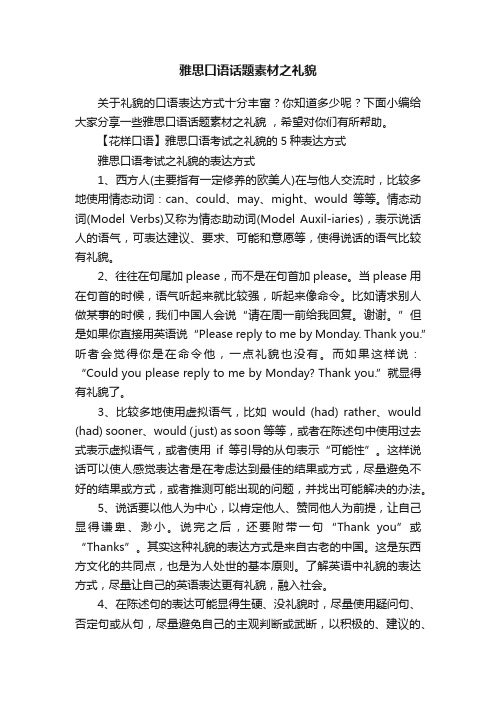
雅思口语话题素材之礼貌关于礼貌的口语表达方式十分丰富?你知道多少呢?下面小编给大家分享一些雅思口语话题素材之礼貌,希望对你们有所帮助。
【花样口语】雅思口语考试之礼貌的5种表达方式雅思口语考试之礼貌的表达方式1、西方人(主要指有一定修养的欧美人)在与他人交流时,比较多地使用情态动词:can、could、may、might、would等等。
情态动词(Model Verbs)又称为情态助动词(Model Auxil-iaries),表示说话人的语气,可表达建议、要求、可能和意愿等,使得说话的语气比较有礼貌。
2、往往在句尾加please,而不是在句首加please。
当please用在句首的时候,语气听起来就比较强,听起来像命令。
比如请求别人做某事的时候,我们中国人会说“请在周一前给我回复。
谢谢。
”但是如果你直接用英语说“Please reply to me by Monday. Thank you.”听者会觉得你是在命令他,一点礼貌也没有。
而如果这样说:“Could you please reply to me by Monday? Thank you.”就显得有礼貌了。
3、比较多地使用虚拟语气,比如would (had) rather、would (had) sooner、would (just) as soon等等,或者在陈述句中使用过去式表示虚拟语气,或者使用if等引导的从句表示“可能性”。
这样说话可以使人感觉表达者是在考虑达到最佳的结果或方式,尽量避免不好的结果或方式,或者推测可能出现的问题,并找出可能解决的办法。
5、说话要以他人为中心,以肯定他人、赞同他人为前提,让自己显得谦卑、渺小。
说完之后,还要附带一句“Thank you”或“Thanks”。
其实这种礼貌的表达方式是来自古老的中国。
这是东西方文化的共同点,也是为人处世的基本原则。
了解英语中礼貌的表达方式,尽量让自己的英语表达更有礼貌,融入社会。
雅思口语考试中必要礼仪介绍
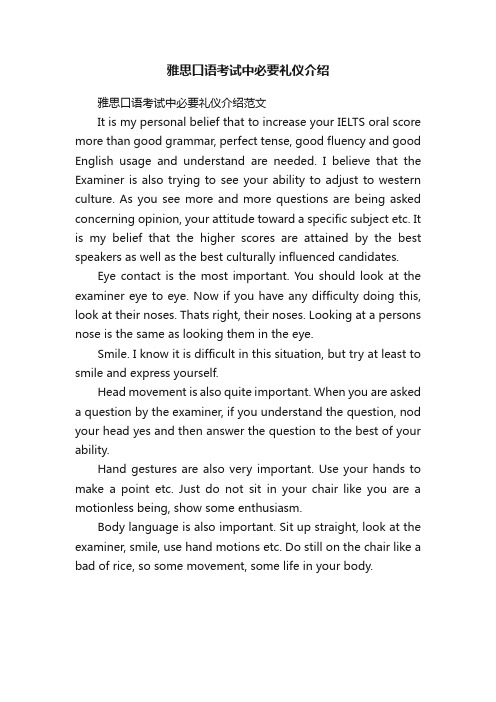
雅思口语考试中必要礼仪介绍雅思口语考试中必要礼仪介绍范文It is my personal belief that to increase your IELTS oral score more than good grammar, perfect tense, good fluency and good English usage and understand are needed. I believe that the Examiner is also trying to see your ability to adjust to western culture. As you see more and more questions are being asked concerning opinion, your attitude toward a specific subject etc. It is my belief that the higher scores are attained by the best speakers as well as the best culturally influenced candidates.Eye contact is the most important. You should look at the examiner eye to eye. Now if you have any difficulty doing this, look at their noses. Thats right, their noses. Looking at a persons nose is the same as looking them in the eye.Smile. I know it is difficult in this situation, but try at least to smile and express yourself.Head movement is also quite important. When you are asked a question by the examiner, if you understand the question, nod your head yes and then answer the question to the best of your ability.Hand gestures are also very important. Use your hands to make a point etc. Just do not sit in your chair like you are a motionless being, show some enthusiasm.Body language is also important. Sit up straight, look at the examiner, smile, use hand motions etc. Do still on the chair like a bad of rice, so some movement, some life in your body.。
- 1、下载文档前请自行甄别文档内容的完整性,平台不提供额外的编辑、内容补充、找答案等附加服务。
- 2、"仅部分预览"的文档,不可在线预览部分如存在完整性等问题,可反馈申请退款(可完整预览的文档不适用该条件!)。
- 3、如文档侵犯您的权益,请联系客服反馈,我们会尽快为您处理(人工客服工作时间:9:00-18:30)。
雅思口语话题素材之礼貌关于礼貌的口语表达方式十分丰富?你知道多少呢?下面小编给大家分享一些雅思口语话题素材之礼貌,希望对你们有所帮助。
【花样口语】雅思口语考试之礼貌的5种表达方式雅思口语考试之礼貌的表达方式1、西方人(主要指有一定修养的欧美人)在与他人交流时,比较多地使用情态动词:can、could、may、might、would等等。
情态动词(Model Verbs)又称为情态助动词(Model Auxil-iaries),表示说话人的语气,可表达建议、要求、可能和意愿等,使得说话的语气比较有礼貌。
2、往往在句尾加please,而不是在句首加please。
当please用在句首的时候,语气听起来就比较强,听起来像命令。
比如请求别人做某事的时候,我们中国人会说“请在周一前给我回复。
谢谢。
”但是如果你直接用英语说“Please reply to me by Monday. Thank you.”听者会觉得你是在命令他,一点礼貌也没有。
而如果这样说:“Could you please reply to me by Monday? Thank you.”就显得有礼貌了。
3、比较多地使用虚拟语气,比如would (had) rather、would (had) sooner、would (just) as soon等等,或者在陈述句中使用过去式表示虚拟语气,或者使用if等引导的从句表示“可能性”。
这样说话可以使人感觉表达者是在考虑达到最佳的结果或方式,尽量避免不好的结果或方式,或者推测可能出现的问题,并找出可能解决的办法。
5、说话要以他人为中心,以肯定他人、赞同他人为前提,让自己显得谦卑、渺小。
说完之后,还要附带一句“Thank you”或“Thanks”。
其实这种礼貌的表达方式是来自古老的中国。
这是东西方文化的共同点,也是为人处世的基本原则。
了解英语中礼貌的表达方式,尽量让自己的英语表达更有礼貌,融入社会。
4、在陈述句的表达可能显得生硬、没礼貌时,尽量使用疑问句、否定句或从句,尽量避免自己的主观判断或武断,以积极的、建议的、比较的、人性的语气,代替消极的、命令的、直接的、武断的语气。
雅思口语Part1答案:Polite礼貌1.Do you think you are a polite person?Very much depends on the situation. I am by nature a very friendly and polite person but I’m also not at all a pushover.这非常取决于情况。
我天生就是个友善礼貌的人,但我也不是个任人欺负的人。
2. Who taught you to be polite?My mom. She told me to be polite when I was young. I'm sure that sometimes, I'm rude or outspoken, but I try to have a good manner. As an idealist, I know that everyone is different, and there are many reasons why people behave the way they do.我母亲。
我小的时候她教我如何礼貌待人。
我知道有时候我有些无礼或者失言,但我尝试着有礼貌。
作为一个理想主义者,我知道每人都不同,我理解人们的表现都有各自的原因。
3. Do you think people should be polite?(Why?) Having polite manners is a huge part of the society because a lot of people do not have good manners and it could ruin a relationship. If you practice good manners, you'll notice that people respond much better to you. They'll listen to what you say and won't feel put off by your bad manners.礼貌是社会构成的重要部分,因为很多人都不懂礼貌,它会破坏关系。
如果你锻炼良好的习惯,你会发现周围的人对你也更好。
他们会听你说话,不会因为你的不礼貌而退却。
4. How do people in your culture show good manners towards others?Say please and thank you whenever you can. People are more likely to respond to a request if they hear please at the end of it. Use the right tone of voice. No one appreciates an abrasive speaking of voice when in conversation.任何时候,要说“请”和“谢谢”。
当人们听到一句话结尾有“please”的时候,更愿意回应你的请求。
还要使用正确的语调,对话的时候没人喜欢听到粗鲁的声音。
5. Have there been any changes in politeness in the past few decades?Nowadays people especially youngsters, most of them tend to behave less polite. In fact, you can see all these impatient and inconsiderate sight almost everywhere in the world. It is really a pity to see all these unwanted sight in public.现在的人们,尤其是年轻人,大多都喜欢表现得没礼貌。
其实,你可以在世界各地看到这种不耐烦的,不顾及他人感受的情况。
在公共场合看到这些让人讨厌的情景真的挺遗憾的。
2017年5-8月雅思口语题库part1话题范文:polite礼貌1.What is politeness in your opinion?Mmmm… for me politeness is treating other people like you would want to be treated, and remembering to say please and thank you, that was something my grandmother always reminded me about.2.When you were child who taught you to be polite?My parents, and especially my grandmother, she was always telling me to say please when I asked for something and to remember to say thank you when somebody gave me something or did something for me.3.Why is it important to be polite to people?It’s one of those things that just makes life nicer, isn’t it? When people are polite, or courteous, it’s just nicer than if they’re not. It makes everyday activities better… if people weren’t polite then maybe we wouldn’t speak to so many different people every day or help people… or ask for help either.4.Do you think people became more or less polite in your country compared to when you were a child?I believe, people have become more of open minded, less formal and more bold in making statements. So, they tend to just say as it is. But, this does not necessarily mean that they don’t respect their parents or elders. I think the problem is that people are not able to express what they feel in a better way.5. In your country’s culture, how do you show that you are b eing polite?To start with, a simple but convincing indicator of good manners, in my opinion, is saying “thank you” to those who help us, “sorry” when we’ve done something wrong and “please” when we ask someone for a favor. What’s more, as you probably kno w, Vietnam is a hierarchical society, which means it’s crucial for the people here to be respectful of their seniors, by using honorifics for instance. Of course, there are many other examples of politeness, but I’m pretty sure the ones I've mentioned above are two of the most fundamental expressions.6.Are we less polite with members of our families than with people we don’t know?I suppose it's normal to be a bit more relaxed about politeness with family members. Most people tend to speak in a more informal way at home; in the UK, we still say "please" and "thanks", but it's fine to use colloquial language and things like nicknames that you would never use with someone you didn't know.7. Do you think we should be polite to those who are not being polite to us?I remember reading somewhere that we should be pleasant to everyone, not because they’re nice, but because we are, and that “manners maketh man”. Justbecause someone is misbehaving doesn’t necessarily mean we should act as badly in return. There’s n o point of downgrading our manners! This only makes other people look down on us. Instead, we’d better try to stay calm and courteous, even to those who don’t really deserve our politeness. And I said “try” because I know that it’s not always easy.礼貌基本用语Please – This is one of those words that can show good manners or come across as sarcastic, based on your tone. Any time you ask for something, it's always a good idea to add this word to soften the request.You're welcome – When someone says, "Thank you," your instant response should be, "You're welcome," "You're certainly welcome," or some variation that feels comfortable to you. Another way to express the same thought is, "I was happy to do it," or, "My pleasure."Thank you – When someone does something nice for you or gives you a gift, you should always say, "Thank you." Not doing so gives the impression that you feel entitled to whatever it is, and that can leave a sour taste in a mannerly person's mouth.May I – The phrase "may I" puts you on the same side as the person you are speaking to. It gives the other person the feeling that you empathize, without your having to say that. For example, when you say, "May I see that book?" you give the person an opportunity to share what she is looking at.Excuse me – This is an acknowledgment that you are asking forgiveness for leaving the table, coughing, or otherwise disrupting something you are engaged in.Pardon me – This phrase is interchangeable with "excuse me." Pardon me sounds more formal.I beg your pardon – Some people, particularly those who learned manners from Southern belle moms, would never have said, "What?" when asking someone to repeat what they'd just said. I was always told that "I beg your pardon" was much more polite and less harsh. The origin of this phrase makes me smile because it means to release someone from punishment.I'm sorry – When you make a mistake, hurt someone's feelings, or do something that you know you shouldn't have done, saying, "I'm sorry," is always the first thing youshould say. You're letting the other person know you regret having done whatever it was.雅思口语话题素材之礼貌相关文章:1.绝佳练习考研口语、雅思口语的口语素材合集2.怎样准备雅思口语素材?3.雅思口语素材之经典的英文长句4.盘点雅思英语口语的最新话题5.雅思英语口语Part 1中最难的十话题6.快来!雅思口语素材中的75个高频短语7.雅思英语口语素材积累8.雅思英语口语模拟话题之你最喜欢的书什么9.雅思口语|练习口语必备的晨读材料。
